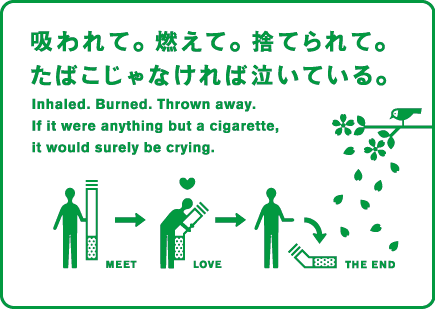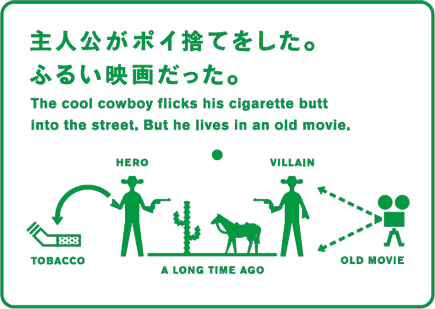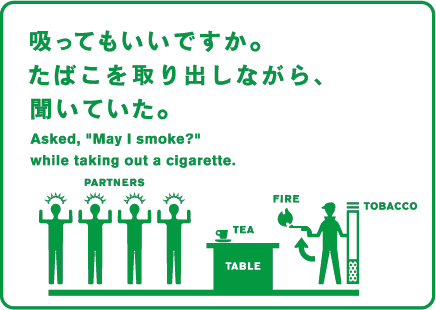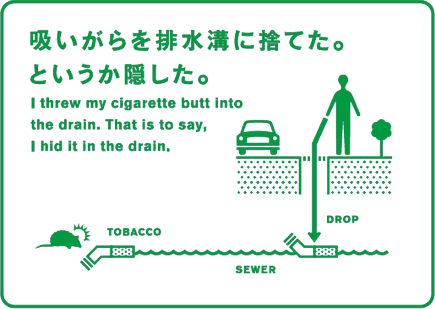Changing Manners in Japan
CONTENTS
Can Ads' Subtle Hints Elicit More Considerate Behavior in Japan?
By Ryoji Shimada
Depending on which dictionary you peruse, a variety of definitions can be found for the word “manner.” Longman Dictionary of Contemporary English for example defines the word first as “the way in which something is done or happens.” The second definition is “the way in which someone behaves towards or talks to other people.” And the third is “polite ways of behaving in social situation.” It is the third of these, according to the dictionary, that stipulates use of the plural form.
All Kinds of Manners in Japan
crossing legs can be a bad manner in Japan
As this article's title suggests, we will be discussing aspects of “manners,” as relates to the third definition. How are manners in Japan differentiated from other countries? For better understanding, according to the dictionary definition, what is considered to be polite behavior in Japanese social situations? As long as you remain within your private, personal sphere, like imagining something in your mind, manners are not a concern. But anything that relates to other people, such as making purchases at a shop or asking a stranger for directions, involve manners that, for better or worse, will require you to abide by certain social conventions. The sheer variety of social situations can be innumerable. We must deal with table manners, business manners, telephone etiquette, shopping manners, manners on public transport, manners on the Internet (commonly known as “netiquette”), driving manners, and many, many others.
Manners Can Change
More's the point, what is considered “mannerly” is not only highly susceptible to geographical location or situations, but has also changed over time. Manners on the train, for example, are one of the most familiar situations that people in Japan encounter on a daily basis. In the greater metropolitan area of Tokyo alone, the total number of people who travel aboard trains runs into the tens of millions every day. It is very easy to understand how their attitudes toward public courtesy might change according to the situation. On a high-speed, intercity express train such as the Shinkansen, for example, it’s not considered bad manners to drink and eat, and licensed vendors can be seen regularly passing through the carriages selling boxed meals and drinks, including alcoholic beverages. But some people feel it would demonstrate poor manners to eat or drink on a commuter train, especially the type with wide, bench-type seats for up to seven people facing each other across the aisle --- a configuration designed to create more space for standing passengers but which accords less privacy for those who are seated.
The perceptions of train passenger etiquette also change over time. Surveys undertaken by the Association of Japanese Private Railways’ reveals the gradual shifts. The accompanying chart indicates changes, based on surveys conducted over four-year intervals, on what people consider bad manners on trains. Talking on the cell phone was previously regarded as the most annoying until 2003, but gradually gave way to other behavior and by 2011 had dropped to third place. Other research among young adults in their early 20s conducted by the Kyoritsu Research Institute shows that members of this age segment are not so annoyed by others talking on cell phones on the train. In fact 70% of them replied they themselves have done it as well.
In conjunction with changing behavior, JR Tokai, which serves cities and towns linking the greater Tokyo and Osaka metropolitan areas, modified its public announcements to “Like setting the mode to silence mode, please refrain from using your cell phone bothering others.” This type of announcement discourages noisy ring tones or talking loudly on the phone, but does not rule out people talking on the phone entirely. In other JR affiliates such as JR East, which covers the greater Tokyo area, the announcement goes: “Please switch off your mobile phone when near priority seats (those designated for elderly and handicapped passengers). In other parts of the train, please set the phone to silent mode and refrain from conversations.” The message clearly discourages passengers talking on the phone --- a rather standard announcement everywhere in Japan except in JR Tokai's sector. JR Tokai's spokesperson said, “Nowadays, many people use their cell phone without apparently annoying other passengers. So we thought perhaps usage of cell phones need not be regulated so strictly.”
Professor Masato Ishikawa of Meiji University, in a newspaper interview, suggested one reason for the ban on conversing on the phone while aboard trains. “Hearing some people chattering doesn’t bother you so much, since by sharing the same space we feel a sense of camaraderie. But when someone talks on the cell phone with a person outside of the shared space, other passengers may perceive that he is jumping out into a separate world, which breaks up the camaraderie.”
The perception manners on the train, also differs according to gender. According to the research conducted in 2011, interestingly enough, only 11.6% of male passengers felt annoyed by a person boarding a crowded train with a baby stroller, whereas 22.3% of female passengers felt that way. In the same way, men tend not to feel annoyed women applying cosmetics on a train, but more women object to this. If manners differ even within areas of the same country and between genders, even wider differences in other countries should be expected.
Overseas Manners on the Cell Phones
Talking on the cell phone on the train is taboo in Japan.
Akira Adachi, a Japanese office worker in Shanghai, remarked, “Not only do I hear loud ring tones on the trains, but also see lots of people talking on their cell phones. Sometimes they are even yelling.” Sayo Marumo, who lives in Pusan, South Korea, observed, “At first I refrained from talking on the cell phone on the bus or the train. Now I don’t feel the least bit ashamed to talk on the phone. In this country everybody does it. But I saw one old lady talking so loudly on the train and everybody gave her a cold look.”
So even though talking on the phone on the train is regarded as something of an annoyance in Japan, it appears to be acceptable public behavior in neighboring Asian countries.
Noisy Public Announcements
Often non-Japanese have been heard to remark interestingly about the blizzard of public address announcements in Japan. A German artist living in Kyoto says, “On the train, in the elevator or escalator, or even on moving walkways, Japan has too many announcements.” An English woman in her 30s remarks, “Some of the announcements are helpful, such as on a rainy day, it might advise ‘Please don’t forget your umbrella when you get off the train,’ but sometimes they are overdone. ‘Don’t carry your luggage on your back in a crowded train,’ is a typical example. ‘Sit in an orderly manner so that more passengers can sit down,’ or ‘Move further inside the train to make it easier for passengers behind you to board,’ and so on. These kinds of manners are not something which should be advised by announcements, but dealt with on the spot, like ‘Excuse me, could you….’ Manners should be something people themselves decide flexibly, not something designated by legal fiat.”
 Professor Ishikawa concurs. “In terms of how society should function, there should be little outside regulation on manners,” he commented. “They’d better be left with each person’s common sense.”
Professor Ishikawa concurs. “In terms of how society should function, there should be little outside regulation on manners,” he commented. “They’d better be left with each person’s common sense.”
Japanese-style Manner Ads
Smokers nowadays must feel restrained as places where smoking is permitted are being reduced year by year. Ads for cigarette products are strictly controlled, so some tobacco companies post manner ads instead. JT (Japan Tobacco Inc.), Japan's largest tobacco producer, has been running a campaign featuring “manner ads” for years. Its various ads urge people to work at improving their smoking manners. JT’s CSR report in 2011 noted that “As the creation of a society where smokers and nonsmokers can coexist in harmony also requires improvement of smoking manners, JT is calling for smokers to give consideration to others around them, including nonsmokers. For example, under the catch line ‘Pay Attention and You Can Change Your Manners,’ many common scenes and themes regarding smoking manners are illustrated and publicized through newspapers, on public transport, at tobacco retailers and in designated smoking areas. These posters encourage awareness by smokers to consider the importance of proper manners and act accordingly.”

Tsuyoshi Kumagai, a 34-year-old male office worker in Tokyo who smokes from two to three packets of cigarettes a day, had this to say about the manners ads: “Instead of signs like ‘Don’t litter!’ that demand compliance with some rule, this sort of ad looks more considerate and will be well accepted.” A 29-year-old female non-smoker remarks, “I like these ads. They are simple and subtle, yet stylish. I don’t see so many ads lately that request people ‘Don’t do this or that.’ Maybe if they are told outright not to do something they will disregard the request and such ads would become less effective.”
On the other hand, a 45-year-old male non-smoker, who was annoyed recently by the sight of a person walking and smoking in a prohibited area, commented, “These sorts of ads are necessary. But maybe a stronger message would be even more effective. Those who habitually violate manners don’t pay much attention to these kind of witty ads.” A 25-year-old man who smokes comments similarly, “Their design is well done, but the message is a little weak. They could make it stronger.”
Outsiders' Opinions
Readers, what are your impressions of these posters? They are just a few examples of JT’s long-running series of manner ads. Do you think they are effective in getting their messages across? If similar ads were to be posted in your country, do you think people would heed their messages?
Having polled various people in western countries, we found these ads achieve a relatively positive impression, although very few respondents said they thought it likely such types of ads would appear in their own country.
“I like these kinds of ads. I think they are very ‘dry,’ understated, and somehow amusing,” an American woman in her 30s says. “They’re calm, and not trying to elicit a reaction. They’re indirect, showing various situations instead of telling people what to do. A gentle nudge, not being bossy or holier-than-thou. (At least, that's how it seems to me, as a non-smoker.) They make people think about how their actions might affect others, which is common in Japan.”
A British man in his 20s also thinks the ads are unique to Japan. “JT ads try to change people’s behavior by making the viewer aware of how their manners affect other people,” he says. “This is quite Japanese, I think. Such ads would work to some extent in the UK, but not as well as they work in Japan because Japanese people are generally more considerate of others.”
But at the same time, the ads' indirectness may prevent the message from getting through. A Swedish woman in her 20s said she thinks it takes time to comprehend the meaning of some.
“For some of them I had to think a bit before I could understand what was their point. For example, the poster that goes, ‘Asked May I smoke? While taking out a cigarette,’ took me a few seconds before I realized that the people in the figure were too polite to protest against the cigarette, and that the smoker should realize beforehand that smoking was inappropriate. This is a reflection on Japanese culture. Japanese people in general tend to be very polite and maybe too polite to complain if somebody disturbs them. In a situation like that in Sweden, most people would be frank enough to say ‘please don’t smoke’ even if the smoker already had lit his cigarette, if they felt annoyed by it.”
“We think that creating rather funny and creative contents will catch the public's interest and attention, eliciting smokers’ understanding and compassion,” says a JT spokesperson.
At least this formula works to some extent in Japan, and might be successful in other countries too. What about in your country? What forms would ads that promote public manners be likely to take?






